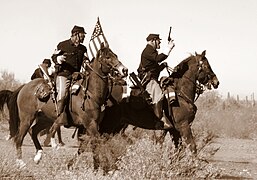Picacho Peak
Name
The place name Picacho Peak is etymologically redundant: picacho means 'peak' in Spanish. In 1775 the peak was referred to as Cerro de Taca 'Taca Hill' by Father Francisco Garcés, using the Oʼodham name Tcacca or Taceo. It was also called Picacho del Tucson 'Tucson Peak' in the past.
Description
The park is celebrated for wildflowers that appear mid-February to early April following good winter rain. Though set next to an interstate highway, the park's west face possesses an unspoiled Sonoran Desert setting. A small flat space on top of the spire can be reached via two trail heads. Portions of the trails are precarious, and hikers are aided by cables and catwalks. These additions make the routes some of the few via ferrata in the United States. From the top, there is a view south to the Santa Catalina Mountains near Tucson, east across Interstate 10 to Newman Peak, northwest to Tabletop Mountain near Casa Grande, north to the many mountain ranges surrounding Phoenix, and west to where the north-running Santa Cruz River runs underground supporting farms in a quaint desert valley.
Park rangers recommend that hikers wear sturdy boots and carry two liters of water per person. Gloves are commonly used to help grip the cables.
History
The Butterfield Overland Mail route had a stop near Picacho Peak. The park is near the site of the Battle of Picacho Pass, one of several American Civil War era engagements to occur in Arizona Territory. A Union cavalry patrol from California skirmished with Confederate scouts from Texas, and three men were killed. This marks the second westernmost battle of the American Civil War. Every year during early March, there are reenactments of the battle and other demonstrations of Civil War military history.
Appearances in fiction
Picacho Peak features prominently in the novel The Host by Stephenie Meyer, serving as a guide to the main character in the first act of the story. Much of the action of the novel takes place in or near the state park.
Plane crash
On June 8, 2024, a plane crashed near the summit of Picacho Peak, killing its pilot, 68-year-old James Galvin of Oro Valley.
Gallery
-
Spring wildflowers at Picacho Peak.
-
Re-enactment of the Battle of Picacho Peak in March 2007.
-
Aerial view of Picacho Peak taken from a Boeing B-17 Flying Fortress on April 20, 2013.
-
Picacho Peak from the ghost town of Sasco.
See also
References
- ^ "Monthly State Parks Visitation Report" (PDF). Arizona Office of Tourism. December 2022.
- ^ "National Register Information System". National Register of Historic Places. National Park Service. July 9, 2010.
- ^ "Picacho Peak". U.S. Geological Survey. Retrieved February 18, 2020.
- ^ The National Gazetteer of the United States of America: Arizona 1986. Denver, CO: Geological Survey. 1987. pp. 472–473.
- ^ Arizona State Parks. "Picacho Peak State Park: Facilities". Retrieved July 12, 2024.
- ^ The westernmost engagement was at Stanwix Station on the Gila River.
- ^ Celaya, Abigail (June 8, 2024). "68-year-old man dead after plane crash at Picacho Peak". Arizona Republic. Retrieved June 8, 2024.



